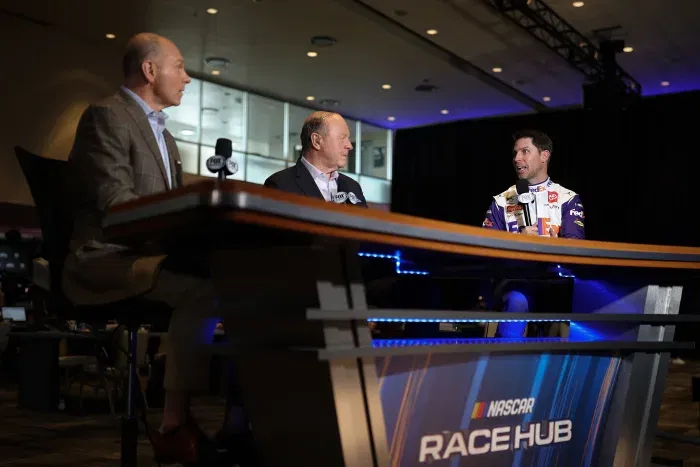
Imago
Photo by James Gilbert

Imago
Photo by James Gilbert
In the fast-paced world of NASCAR, every lap is a battle, and every pit stop a gamble. In such an environment, it’s the broadcasters who are the unsung heroes, bringing the drama to life for millions of fans. They don’t just call the race; they weave stories of strategy, rivalries, and raw speed, making every moment feel personal. From legends like Darrell Waltrip, who swapped a steering wheel for a microphone, to modern voices like Jeff Gordon, broadcasters shape how the sport resonates with its audience.
Watch What’s Trending Now!
Their insights, drawn from years on the track or in the booth, are crucial to NASCAR’s appeal, especially as technology like real-time stats and multi-angle replays raises the bar for commentary. Rewind to 1979, when the Daytona 500 became the first NASCAR race broadcast live from flag to flag. The post-race brawl between Cale Yarborough and the Allison brothers, paired with Ken Squier’s gripping commentary, turned a regional sport into a national sensation.
That moment showed the power of a broadcaster’s voice to elevate NASCAR’s profile. Today, platforms like X amplify every opinion, letting insiders and fans alike weigh in instantly. This openness fuels connection but also sparks friction, especially when bold takes challenge who belongs in the booth. One such comment recently lit up the NASCAR world, raising questions about experience and credibility.
Brett Griffin’s public jab at Parker Kligerman
On July 21, 2025, Brett Griffin, a veteran spotter for Justin Haley and co-host of the “Door Bumper Clear” podcast, dropped a bombshell on X: “I like Parker, but Jamie and Shannon are all we need at the desk. Let him do Xfinity, but I don’t want a college football player analyzing an NFL game.” The target was Parker Kligerman, a part-time NASCAR driver and NBC Sports broadcaster. Griffin’s analogy cuts deep, implying Kligerman lacks the expertise to analyze Cup Series races, despite his racing resume. The statement, posted publicly, has fueled a firestorm of debate about what qualifies someone to call NASCAR’s top-tier races.
I like Parker but Jamie and Shannon are all we need at the desk. Let him do Xfinity but I don’t want a college football player analyzing a NFL game.
— Brett Griffin (@SpotterBrett) July 20, 2025
Griffin’s credentials give his words weight. Since the early 2000s, he’s been a spotter for drivers like Clint Bowyer and now Haley, a role requiring intimate knowledge of Cup Series dynamics. His podcast, known for its candid takes, reaches thousands of fans weekly, amplifying his influence. The “Jamie and Shannon” his champions are Jamie Little (who’s reported on NASCAR since 2004 and joined FOX in 2015) and Shannon Spake (a studio host since 2016).
Both have deep NASCAR roots, with Little covering over 500 races and Spake anchoring major broadcasts. Griffin’s point is clear: their experience outshines Kligerman’s, who’s newer to the booth and hasn’t raced a full Cup season. The backlash was swift. Fans on X split, with some backing Griffin’s call for seasoned broadcasters, while others defended Kligerman’s unique perspective as an active driver.
Kligerman’s no stranger to NASCAR; he’s made over 250 starts across the Cup, Xfinity, and Truck Series since 2009, including a 2012 Truck Series win at Talladega. He joined NBC in 2020 as a pit reporter and expanded to Cup analysis by 2023. His supporters argue his current racing keeps him in tune with the sport, unlike retired drivers turned broadcasters.
Yet Griffin’s jab taps into a broader debate: does a broadcaster need Cup-level racing experience to call those races? This question lingers as Kligerman’s career path sheds light on his dual role. But to understand the heat behind Griffin’s critique, Kligerman’s journey from the track to the booth tells a bigger story.
When Kligerman stepped back from full-time Xfinity racing
Kligerman’s last full-time Xfinity Series season was in 2013 with Kyle Busch Motorsports, where he finished a respectable 9th in points at just 23. That year, he showed promise, battling for top-10s in a competitive field. But NASCAR’s financial realities hit hard. “It’s a tough business when funding dries up,” Kligerman said in 2023, reflecting on how sponsorship struggles forced him to rethink his career. Without consistent backing, a full-time ride slipped out of reach, a common hurdle for talented drivers in the sport’s lower tiers.
By 2014, Kligerman had shifted to part-time racing, competing in Xfinity and Truck Series events when opportunities arose. His 2023 return as a full-time season with Big Machine Racing in Xfinity, including a top-10 finish at Fontana, California, kept him active on the track. Meanwhile, he joined NBC Sports in 2020 as a pit reporter for Xfinity races, a role that leveraged his driver’s insight. “I bring a current driver’s view,” he said, emphasizing how his ongoing racing informs his commentary. This dual role sets him apart, offering fans a perspective rooted in real-time experience rather than past glory.
Critics like Griffin, however, see a gap. Fellow insider Freddie Kraft, on the “Door Bumper Clear” podcast, echoed the sentiment. “Cup’s a different beast.” Kligerman’s limited Cup starts, only 33, fuel doubts about his authority to analyze the series. Yet his supporters highlight his adaptability, noting how his 2012 Talladega win and years of grinding through NASCAR’s ranks prove his grit. As the sport’s media landscape evolves, Kligerman’s hustle shows that credibility can come from persistence, not just trophies.








